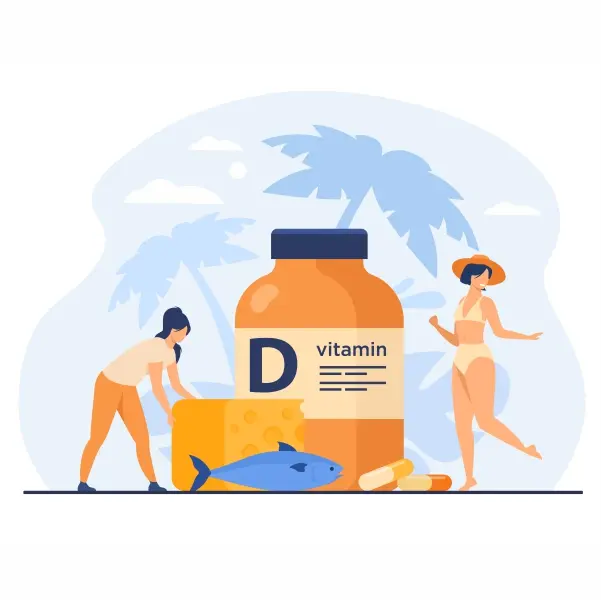Role of Vitamin D in immunity


Vitamin D, also referred to as "calciferol," is a fat-soluble vitamin that is sold as a dietary supplement and added to a few foods. Endogenous vitamin D synthesis occurs when ultraviolet (UV) rays from the sun strike the skin and initiate the process of vitamin D synthesis. It can be absorbed and stored in the body's cells because it is fat-soluble. Being the only vitamin the body can make on its own, it occurs when skin cholesterol is exposed to ultraviolet B (UVB) rays. It is then absorbed into your blood and transported to your tissues and kidneys by chemical reactions taking place in your liver. The end result is vitamin D (also known as calcitriol)1.
Importance of Vitamin D:
Recently, especially in relation to COVID-19, much focus has been placed on the significance of vitamin D's numerous functions in immune system health. Vitamin D is essential for the healthy operation of every system in the human body because it regulates and protects every type of cell, tissue, and organ. In addition, vitamin D has an impact on bone health. Considering that vitamin D regulates immune cells and inflammation, the immune system is particularly affected by this8.
Role of Vitamin D in Immunity1,2:
Because vitamin D plays an important role in a healthy immune system, people with low vitamin D levels are more likely to suffer from colds or coughs recently, research shows. Vitamin D is said to support the body's immune system.
- Respiratory Health: White blood cells involved in the body's innate and adaptive immune responses are activated by vitamin D to start the process. These cells are found all over the body, including in the linings of the upper and lower respiratory tracts. The viruses and bacteria that cause the aforementioned health problems can be combated by these cells once they have been activated. Despite the fact that there are numerous causes of respiratory imbalances, some research suggests that taking vitamin D supplements daily or once a week is good for respiratory health. The highest level of defence is linked to vitamin D deficiency3.
- Immune Response: In addition to the innate and adaptive immune responses generated when fighting microbes and viruses, current research indicates that vitamin D deficiency may have a negative impact on heightened immune responses4.
- Additional Advantage of Vitamin D: Additional Benefits Of Vitamin D: Activated vitamin D enhances a number of physiological processes. First off, calcium and vitamin D work well together. Calcium absorption is aided by vitamin D, and calcium is necessary for the formation of bones. By regulating skin oil production and maintaining a healthy pH balance, vitamin D can prevent acne. Additionally, mood enhancement has been connected to it.
Causes Of Deficiency5:
The majority of people do not consume enough vitamin D, and it should be emphasized that an estimated 1 billion people worldwide are vitamin D deficient. Additionally, 57% of Americans have insufficient levels of vitamin D. These startling results are largely the result of numerous environmental and behavioural factors.
- Lack Of UV Exposure: Insufficient exposure to sunshine is the key reason for the rise in vitamin D insufficiency. Nonetheless, spending more time outdoors is not the answer. Many of us reside in northern latitudes (basically everything north of Florida) where there is insufficient sunlight throughout the entire year. Even for those with access to abundant natural light, nine-to-five desk jobs make it challenging to spend more time indoors. In addition, the use of UV-blocking sunscreen to preserve the skin and prevent accelerated ageing hinders the production of the vast majority of vitamin D.
- Age plus complexion: As you get older, your body naturally produces less vitamin D. A 70-year-old produces a lot less vitamin D than a person of younger age. Another important factor is skin tone. Those with darker skin produce less vitamin D than those with lighter skin. You will probably need sources of vitamin D besides the sun, especially if you are older.
How To Get Enough Vitamin D6:
Examining your lifestyle is a fantastic indicator of whether or not you may be vitamin D deficient. However, the only way to know for certain is to have your doctor conduct a vitamin D test. This will determine how much dietary supplementation you may need.
- Supplements: Taking supplements is the best way to get enough vitamin D while maintaining skin protection. Nutritional supplements with vitamin D2 and D3 are available. Since the body makes this form of vitamin D3, it is the best. While vitamin D3 is typically made from animal sources, vitamin D2 is frequently made from plant sources. On the other hand, lichen-based vitamin D3 supplements are offered. Medical experts disagree on the optimal vitamin D intake. The current U.S. government recommendation is 2,000 IU, but considering how little sun our population gets, this may not be enough. For those who need an extra boost, the daily maximum is 4,000 IU.
- Sunshine: The most organic way to raise vitamin D levels is to spend time outside in the sun. Even so, a number of elements could make this choice impractical. Daily sun exposure can be next to impossible during the winter, in cold climates, and during busy workdays. SPFs greater than eight prevent the skin from absorbing vitamin D3 even in the summer. Due to the potential risks of overexposure, it may be challenging to obtain the nutrients from the sun.
- Food Sources: Although the vast majority of foods lack vitamin D, some do contain enough to meet your needs. But you should continue to make an effort to eat foods that are high in vitamin D. These foods are loaded with a variety of other health-enhancing ingredients in addition to vitamin D. These foods are among the best sources of vitamin D: one whole egg contains 20 IU, cooked wild salmon contains 360 IU, cooked mackerel has 345 IU, and sardines in oil, drained, weighs 49 g.
Refrance
- Aranow, C. Vitamin D and the immune system. J Investig Med 59, 881–886 (2011).
- Bippen, J. How Vitamin D Supports Your Immune System. HUM Nutrition Blog Learn more (2020).
- Tomaszewska, A. et al. The Role of Vitamin D in COVID-19 and the Impact of Pandemic Restrictions on Vitamin D Blood Content. Frontiers in Pharmacology 13, (2022).
- How the Immune System Relies on Vitamin D. GrassrootsHealth Learn more.
- Charoenngam, N. & Holick, M. F. Immunologic Effects of Vitamin D on Human Health and Disease. Nutrients 12, 2097 (2020).
- Office of Dietary Supplements - Vitamin D. Larn more.

